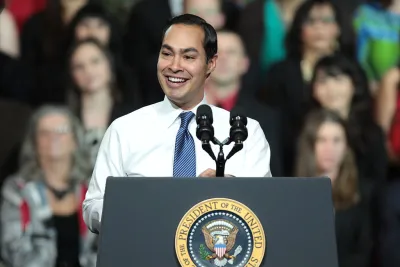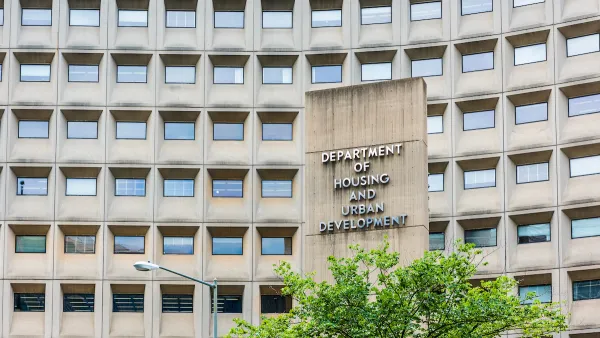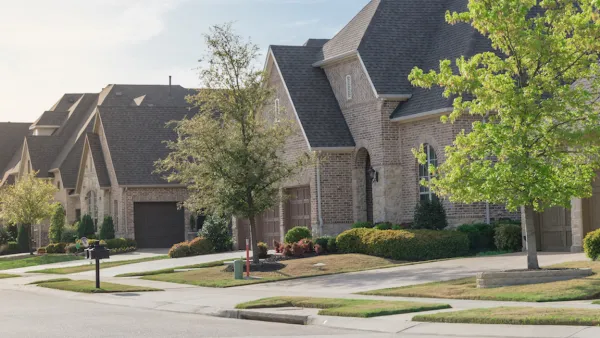"We use housing as a platform to create greater opportunity in people's lives."

On a recent episode of NPR's The Diane Rehm Show, Julian Castro, Secretary of the Department of Housing and Urban Development (HUD) and former mayor of San Antonio, talked about the need for a "holistic" approach to improving outcomes for low-income households. He recalls a woman he spoke with whose elderly mother has diabetes. The doctor prescribed her a daily walk outside. "But her mother couldn't walk around the neighborhood because there weren't any sidewalks, and there were loose dogs. That was the first time as a young policymaker I thought, wow - how connected all these things are."
He addresses the stigma surrounding Housing Choice vouchers, which represent the largest component of HUD's $46 billion budget. He points out that the two million low-income families who use vouchers contribute 30 percent of their income to rent, and the remainder is subsidized. "I think there's this image of Section 8 holders that they don't have any skin in the game. They absolutely do." Addressing the perceived inefficiencies of a large government program, he says, "In 1981, we had 16,500 employees. Today, we have about 8,000 employees. We try to ensure that the bureaucratic process is as tight as possible so that more landlords will be willing to work with us."
The Secretary also discusses race and the evolving role of the Federal Housing Agency (FHA), which HUD oversees, in improving access to home ownership for minorities. "There was a time when the FHA was part of the problem. Now it's part of the solution." NIMBY-ism, however, is often still motivated by racial prejudice. While it's common for homeowners to care about what goes on in the neighborhood, he says, "You can clearly see in a decent number of cases that there's something else that's animating it."
He discusses an initiative to increase internet access in public housing. "More than half of low-income families out there do not have access to the internet. Connect Home is a public-private partnership in 28 communities around the U.S. to hook up folks who live in public housing with either free internet, or very very low-cost internet."
But he concedes that affordable housing—not public housing—is the agency's focus. "For somebody earning minimum wage, there isn't a single city where you can afford a two-bedroom apartment for rent, and only a few cities where you can afford a one-bedroom. What are we doing?" For one, he says, the Promise Neighborhood initiative.
"We have moved away from the old model of stacking folks in public housing buildings. Admittedly, we still have a long ways to go."
FULL STORY: A Conversation with Julian Castro, Secretary of the Department of Housing and Urban Development

Analysis: Cybertruck Fatality Rate Far Exceeds That of Ford Pinto
The Tesla Cybertruck was recalled seven times last year.

National Parks Layoffs Will Cause Communities to Lose Billions
Thousands of essential park workers were laid off this week, just before the busy spring break season.

Retro-silient?: America’s First “Eco-burb,” The Woodlands Turns 50
A master-planned community north of Houston offers lessons on green infrastructure and resilient design, but falls short of its founder’s lofty affordability and walkability goals.

Test News Post 1
This is a summary

Analysis: Cybertruck Fatality Rate Far Exceeds That of Ford Pinto
The Tesla Cybertruck was recalled seven times last year.

Test News Headline 46
Test for the image on the front page.
Urban Design for Planners 1: Software Tools
This six-course series explores essential urban design concepts using open source software and equips planners with the tools they need to participate fully in the urban design process.
Planning for Universal Design
Learn the tools for implementing Universal Design in planning regulations.
EMC Planning Group, Inc.
Planetizen
Planetizen
Mpact (formerly Rail~Volution)
Great Falls Development Authority, Inc.
HUDs Office of Policy Development and Research
NYU Wagner Graduate School of Public Service




























